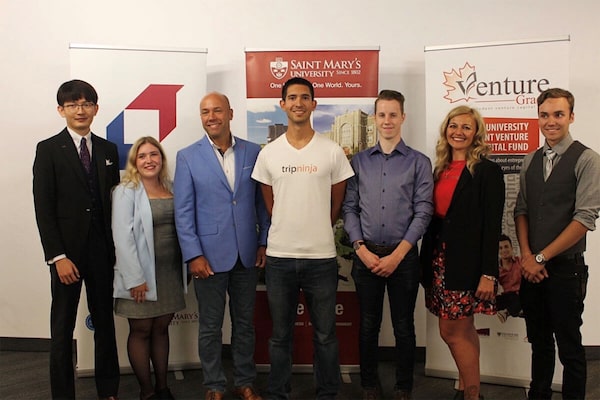
In September 2018, Saint Mary’s University’s Venture Grade Student Investment Fund made its first $15,000 investment in travel start-up Trip Ninja.Venture Grade
Last year, Andrew Doan got to experience first-hand what it’s like to be a venture capitalist.
Along with a team of fellow MBA students, Mr. Doan approached business leaders to raise funds, identified and assessed in which to invest and, ultimately, closed the deal with two promising, early-stage startups.
The VC experience came by way of a unique program at Mr. Doan’s school, the Sobey School of Business at Saint Mary’s University in Halifax. The Venture Grade student investment fund is the foundation of a course offered at the undergraduate and graduate level at Sobey, but it’s also a real venture capital fund.
Mr. Doan says that when he heard about the program, he jumped at the chance to get involved.
“I thought it would give me an opportunity to do real-life business exploration and networking,” says Mr. Doan, who is originally from Regina. “And the process of raising funds would be an experience I wouldn’t be able to get anywhere else.”
The Venture Grade fund is the brainchild of Sobey professor Ellen Farrell. It’s about “learning entrepreneurship from the inside out,” she says.
“If you’re an entrepreneur and you think that some day you’re going to need significant funds because the $5,000 you raised from your parents is not going to cut it, you need to know how the world of venture capital works,” Dr. Farrell says.
While many universities have student investment funds, where the students are given money to invest in publicly traded equities, this program is different because it’s private equity and students need to raise the money themselves, she explains. Students make connections by attending networking events, then approach Halifax-based businesses, high-net-worth individuals and Sobey alumni to invest in their fund. The Venture Grade students have raised about $200,000 so far.
“Nobody realizes how much anxiety, effort and intelligence it takes to sit down in front of potential donors, explain the program and the benefits to the community, the university, the student and the investor, and then ask for $10,000 or $50,000,” Dr. Farrell says. “I’ve had many experienced, capable students in great industries who tell me, ‘I can't believe how nervous I was.’ That front-end piece is perhaps the most career-building part of it.”
Mr. Doan says that approaching business leaders in the community was a bit overwhelming at first. “It can be intimidating to meet such successful people, but once you get the hang of it, it's enjoyable,” he says.
In addition to raising funds, students identify high-growth young companies and select the ones with significant upside potential. Since word has gotten out about the fund, Dr. Farrell says startups are pitching from as far away as Newfoundland.
“It is the real deal,” Dr. Farrell says. “The [investments] have to be vetted by our governance board, which includes a lawyer and a VC and myself, and everybody’s asking really tough questions.” Once a company has been selected for investment, the students then make, monitor and oversee the deal.
So far, Venture Grade has invested in two Halifax-based companies: Trip Ninja, a multi-city travel-planning platform, and Cribcut, an online marketplace for hairstylists who provide services at homes or offices. Both companies received a $15,000 investment, and Dr. Farrell says a third deal is under consideration. (Any returns from exits down the road will be channelled back into the fund.)
While investment amounts have been small so far, the companies selected by the fund can potentially end up with even more in their pocket. Dr. Farrell says Innovacorp, Nova Scotia’s early-stage venture capital organization, has adopted the Venture Grade fund as a “sidecar,” meaning it will invest in anything that the students invest in.
“They’re relying on the due diligence of the students to make small investments,” she says. “It’s a great collaboration.”
In addition to their deal-making responsibilities, Venture Grade will also host the Canadian division of the international Venture Capital Investment Competition (VCIC), which will be held at Saint Mary’s in March, involving 12 schools from across the country.
Because they are hosting this yearʼs Canadian VCIC, the Venture Grade team also compete in the U.S. event. Last year, they took second place at Boston University’s VCIC, beating teams from schools including Yale, Dartmouth and the Massachusetts Institute of Technology (MIT).
“So the wealth of capability that’s being developed in students in the program is quite broad,” Dr. Farrell says. “We’ve looked around quite a bit, and I would say we have the most comprehensive venture capital program in a university in Canada.”
Mr. Doan says participating in the fund piqued his interest in both venture capital and entrepreneurship.
“You can have such an impact by being an entrepreneur,” says Mr. Doan, who’s graduating from the MBA program in May. “It's risky and difficult, but it’s very rewarding as well.”
He says that for anyone interested in startups or financing, Venture Grade is a “one-of-a-kind experience” that’s well worth it.
“I don’t know how I could have got this opportunity otherwise,” Mr. Doan says. “It created a whole new field of interest for me in my potential career.”
Advertising feature produced by Globe Content Studio. The Globe’s editorial department was not involved.